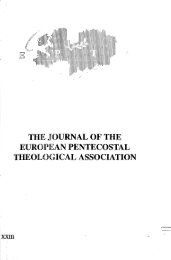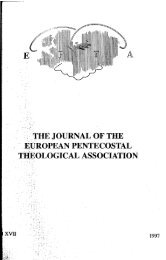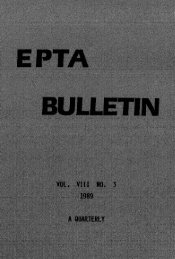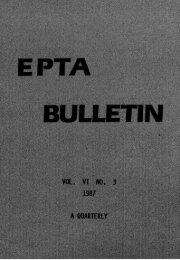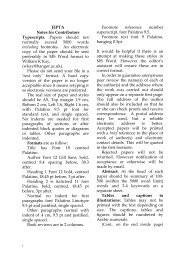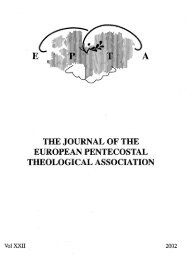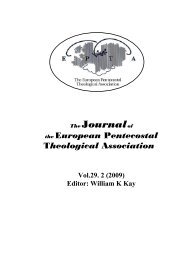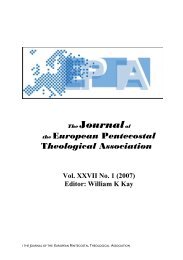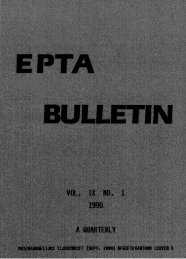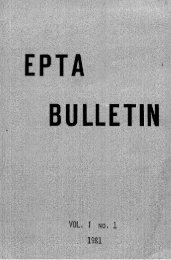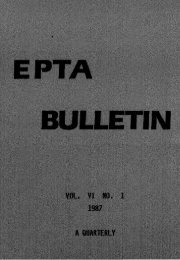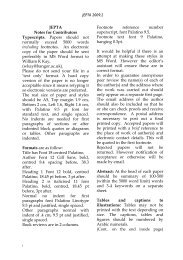jepta 2001 21 - European Pentecostal Theological Association
jepta 2001 21 - European Pentecostal Theological Association
jepta 2001 21 - European Pentecostal Theological Association
Create successful ePaper yourself
Turn your PDF publications into a flip-book with our unique Google optimized e-Paper software.
The Journal of the <strong>European</strong> <strong>Pentecostal</strong> <strong>Theological</strong> <strong>Association</strong>, Vol. XXI, <strong>2001</strong><br />
Arthur Booth-Clibborn: <strong>Pentecostal</strong> Patriarch: James Robinson<br />
The Gospel Publishing House is now in<br />
possession of a powerful book, entitled Blood<br />
Against Blood, written by Arthur Booth-<br />
Clibborn, an English (sic) <strong>Pentecostal</strong> brother<br />
who has been the means of a glorious ministry in<br />
Germany (sic) before the opening of the war ... We<br />
recommend that you purchase it and become<br />
imbued with the spirit of its contents.'<br />
In Britain, by contrast, where conscription was introduced in 1916, the book was<br />
banned and all copies were withdrawn from circulation2 - a reflection of the<br />
jingoistic fervour with which the war was pursued in its earlier stages. The<br />
Established Church was solidly supportive of the war. The Presbyterian<br />
theologian, John Oman, obscrved that, in cultivated circles, "the religious official<br />
is the most belligerent person present".' The Bishop of London went overboard<br />
on the issue and called in the Guardian for the Church, as the headline<br />
proclaimed, to "MOBILISE THE NATION FOR A HOLY WAR.' The great<br />
majority of the 16,500 conscientious objectors were committed Christians and it<br />
was only from Free Church sources that some defence was mustered against their<br />
appalling mistreatment.<br />
~ hwhole g pacifist issue became a particularly searching one for <strong>Pentecostal</strong>s in<br />
Britain and though there was no official line on conscientious objection among<br />
the various assemblies, nevertheless, in Donald Gee's words, conscription<br />
"precipitated a personal issue of deep gravity for many young men among<br />
<strong>Pentecostal</strong> believers".' While Boddy and Polhill "manifested a strongly<br />
favourable attitude towards active participation in the conflict ... Booth-<br />
Clibborn ...p resented his own view in no half-hearted manner, and probably<br />
helped to influence many".6 The personal cost involved was commented on by<br />
I Ibid, 51. The quotation was taken from Weekly Evangel, (10 July 1915) 1. The Gospel<br />
Publishing House is the publishing arm of the American A. 0. G. That Booth-Clibbom regarded<br />
himself as Irish comes out in an article he wrote for ConJidence in 1910 when in a piece of mild<br />
whimsy he asked "if an Irishman may coin an Irishism". (Confidence, June 1910, 145)<br />
Information obtained from Desmond Cartwright. He has a copy of the book inscribed by its<br />
owner stating, doubtless as an _expression of his displeasure, that the book was to be confiscated<br />
' Adrian Hastings, A History of English Christianiry 1920-1990, SCM: London (1991) 46.<br />
' Ibid, 45.<br />
9. Gee, Wind and Flame, Heath Press: Croydon (1967) 101.<br />
Ibid, 101-2. Frank Banleman was the primary chronicler of <strong>Pentecostal</strong> origins in Los Angles<br />
in his How Pentecosf Came to Los Angeles (1925), Between 1912 and 1914, he visited Europe,<br />
including England, when it is almost certain he met with Booth-Clibborn. Some of his semons<br />
were directed against the "the war spirit in Christians". At a central meeting in London, he met<br />
resistance from the Chairman [almost certainly Polhill]. The latter said "if he were a young<br />
man he would enlist himself. ..But some thanked me (Bartleman) for (the address) later,<br />
especially some of the missionary student young men, members of the P. M. U". (Jay Beaman,<br />
op. cif., 56).<br />
Gee years later when he spoke of a young married couple who had been<br />
conscientious objectors visjting Margaret Cantel ''to seek counsel and comfort in<br />
their problems and trials". In his own case, he could recollect "the months and<br />
years of continual obloquy and petty persecution (which for him) meant a growth<br />
in character and convigtion that would have come much more slowly under<br />
peaceful circumstances". Later in life he was to observe<br />
as a solemn fact that those who took a strongly<br />
patriotic stance in the last War, among our<br />
<strong>Pentecostal</strong> brethren, have mostly gone<br />
backwards in spiritual power and influence ever<br />
since; while those who put Christ and his Word<br />
before all have advanced by divine grace to<br />
positions of spiritual leadership. It could hardly<br />
be otherwise.'<br />
When that was written, the names of Boddy and Polhill must have been in mind.<br />
If so, it was not the most judicious of his judgements since their diminishing<br />
influence within the British movement does not lend itself to such simplistic<br />
analysis.<br />
CONCLUSION<br />
The one intriguing question surrounding his <strong>Pentecostal</strong> involvement was<br />
whether or not he ever spoke in tongues. In Confidence (June 1911), it was<br />
reported that he said he had not yet spoken in tongues, "and would not be<br />
satisfied till he did".* In most of the early <strong>Pentecostal</strong> assemblies in Britain, the<br />
absence of glossolalia would have been taken as an indication of his not having<br />
received Spirit baptism. For van der Laan this might account for his absence<br />
from the International <strong>Pentecostal</strong> Council that met in the years between 1912<br />
and 1914.' However that question is answered, there is no doubting the salient<br />
part Booth-Clibborn played in the early <strong>Pentecostal</strong> movement. The high public<br />
profile of his wife and the contribution of three of their sons to the wider<br />
international movement kept the Booth-Clibbom name to the fore in <strong>Pentecostal</strong><br />
circles and beyond. His family background gave him a cachet unrivalled in the<br />
I Redentpfion Tidings (2 January 1939) 6.<br />
Jay Beaman, op. cit., 62.<br />
' Ibid, 63-4. In the second group he would no doubt have placed Howard and John Carter,<br />
Stanley Frodsham and Margaret Cantel. Bartleman spoke at the Cantel meeting and also at A.<br />
E. Saxby's church, "where the leader thanked me warmly" (56). Saxby was the youthful Gee's<br />
pastor and was a strong influence on him but later was sidelined in the movement once he<br />
started to promulgate the teaching of "ultimate reconciliation".<br />
' Confidence, June 191 1,128.<br />
' C. van der Laan , op. cit., 66.



